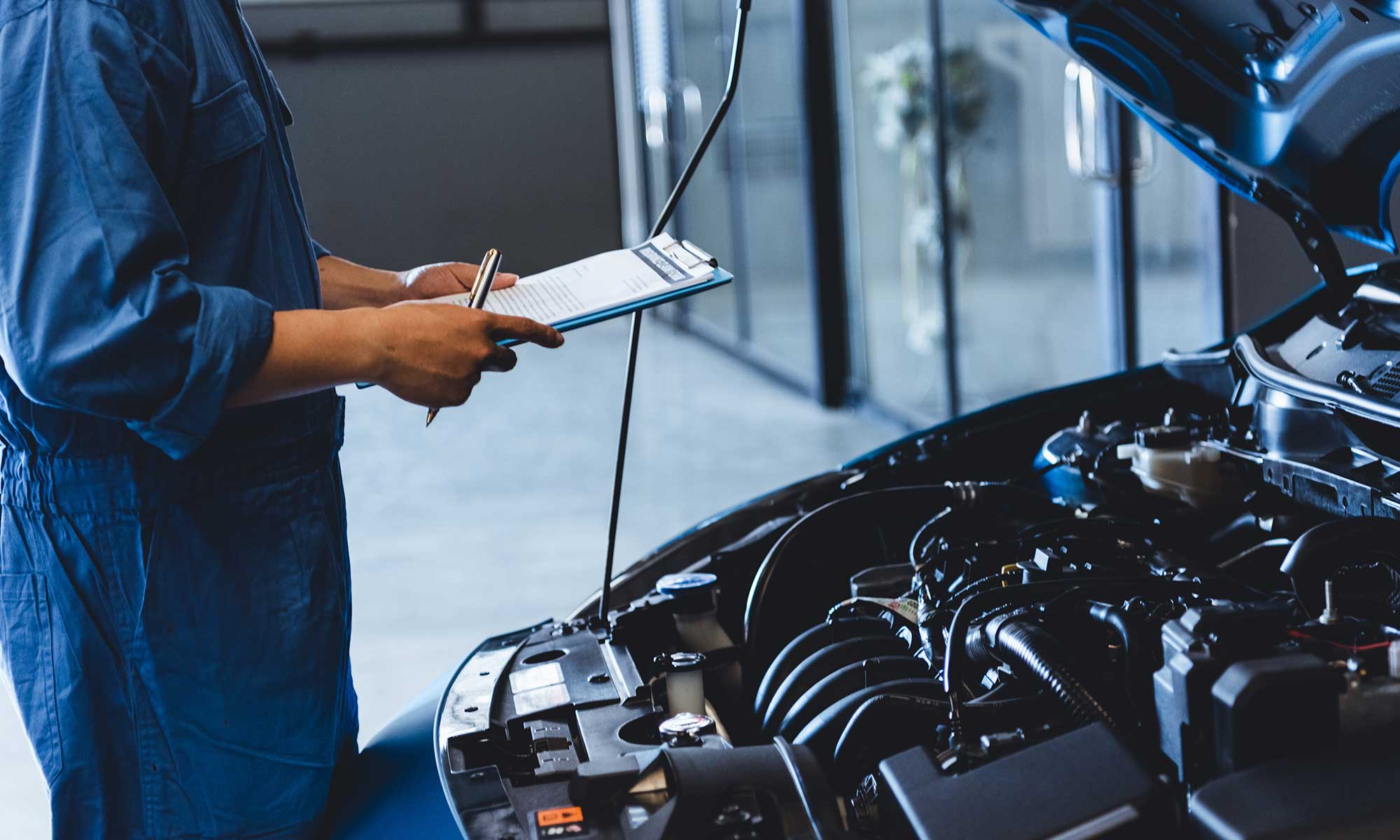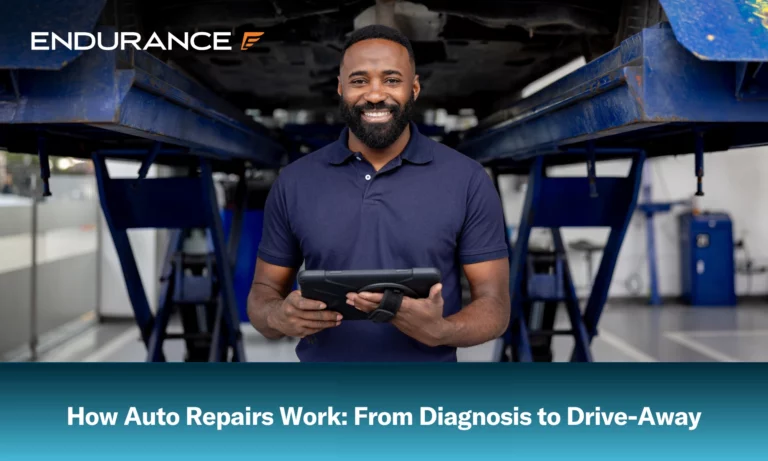How Do I Know If I Have a Bad Alternator?

You get in your vehicle and turn the key, the starter motor kicks in for a moment, but nothing happens. Most people would assume their car battery has died at this point, but it’s just as likely that another part is at fault—the alternator.
Your vehicle won’t have access to electricity when the alternator isn’t working properly. So any electronic accessories, like the power windows, or your engine will be able to function properly, which can require a huge investment to fix.
Alternator replacements usually require a few hundred to cover parts and labor, but you can always invest in an extended warranty to cover car repairs or identify early alternator problems ahead of time.
Keep reading for tips on how to determine if you have a bad alternator.
Bad Alternator Diagnostic Checklist
When your vehicle fails to start, it’s easy to think the problem is related to your battery. However, that’s not always the case, as this can also mean your alternator may be faulty or need replacing. Some of the things to look for when troubleshooting is dimming lights, strange noises, or weird smells while driving.
Here’s a checklist to consider when trying to figure out if you’re driving with a bad alternator.
1. The Battery is Dead
If your alternator is faulty, your battery can’t charge. When your battery can’t charge, you’ll experience trouble starting your vehicle.
The best way to figure out what’s causing your dead battery is to jumpstart your car with jumper cables. The electrical current will help get you back on the road and the nearest repair shop to get professional attention. If your vehicle dies again shortly after recharging, chances are it’s your alternator that’s at fault.
You’ll also know if it’s your alternator if other electrical problems start popping up in addition to your car’s battery not starting.
2. Battery Warning Light Appears on Your Dashboard
One of the key signs you have a bad alternator is when the battery warning light on your dashboard turns on. Many believe this signal only applies to battery-specific issues, but this light also flags when other surrounding parts need a professional technician’s attention.
Alternators are intended to operate at a specific voltage—generally between 13 and 14.5 volts. If they malfunction and go any lower or higher than the number stated in your owner’s manual, the dashboard light will appear.
If the additional strain of electronic accessories in your vehicle is what’s pushing your alternator over the edge, you may only see the battery light flickering whenever they’re in use. While this might not seem like too much of an emergency, make sure to get it fixed before the problem gets worse.
3. Headlights are Dim or Flickering
A failing alternator provides inconsistent power to the electrical components of your vehicle. Because of this, you may notice your headlights are much dimmer than usual or that they keep flickering. In the case of an alternator that’s pumping out too much voltage, your headlights may even be too bright.
4. Other Electrical Issues
Your starter motor and headlights are two of the most prominent places to spot alternator issues, but you may notice signs in other electrical components too. Your windows may take longer to roll up and down than usual, your car stereo might not switch on, or your dashboard could be going haywire.
Modern cars are smart and generally cut power to electrical parts in order of importance. So, if the onboard computer notices an issue with your alternator, it’ll stop supplying your radio first to keep your headlights on—giving you more time to get to the nearest repair shop.
5. Difficulty Starting or Stalling
Whether you’re driving a Tesla or a diesel-powered pickup, every car runs on electricity to some extent. Without it, they can’t get very far.
As your vehicle’s source of electricity, the alternator powers the spark plugs that ignite the fuel in your engine. If the spark plugs lose power at any point, fuel combustion can suddenly stop, causing the engine to stall out of nowhere.
If you notice your vehicle keeps doing this, make sure to get it looked at immediately. Or eventually, it won’t be able to start up at all.
6. Rattling or Whining Noises
Many things can cause unusual noises in your vehicle (like you singing along to 80s power ballads on the daily commute), but alternator failure is undoubtedly one of them.
If your alternator isn’t working as it should, bearings in the engine may begin to rattle, or the alternator’s pulley can start to whine. Match these noises up with any of the other symptoms we’ve mentioned, and you’ve got a pretty solid diagnosis.
7. Burnt Smells
Your alternator’s drive belt is under constant strain, so it only makes sense that it’ll wear down eventually. As it does, you may smell burning rubber since it’s so close to the hot engine.
If damaged or frayed wires are the problem, you may smell something similar to an electrical fire. Whatever the cause, burning smells from under your hood are always a significant concern and should be seen by a professional before things get worse.
How Much Does it Cost to Fix an Alternator?

Replacing a faulty alternator can cost you up to $1,710 with parts and labor. The cost depends on the type of vehicle you drive and the extent of the repair.
When replacing a faulty alternator, technicians are required to disassemble your vehicle to ensure everything is working correctly, and no other issues are missed. Some makes are manufactured differently than others, which can impact the amount of time it takes to complete this job.
If you’re worried about paying out-of-pocket for repairs, you can look into breakdown protection coverage that works to cover parts and labor while also offering everyday driving perks.
Do Alternators Fail Suddenly?
Like most essential components, your alternator experiences damage over time and can break down when you least expect it. To avoid this from happening, you can follow a routine maintenance schedule that checks the condition of your alternator, battery, and other parts like your transmission.
By doing this, you’re reducing the chances of a breakdown in the future and allowing yourself to handle premature damage early on.
Can a Bad Alternator Destroy a New Battery?
Yes, a bad alternator can quickly destroy a new battery. A faulty alternator can cause damage by overcharging or undercharging, all of which increase the chance of experiencing battery problems.
To protect your vehicle and your wallet from overspending, have an ASE Certified technician take a look at your electrical system if you’ve recently been having a hard time starting your car. They’ll be able to identify whether or not you need a new battery or an alternator to get back on the road.
Save Thousands on Vehicle Repairs with Endurance
Even if you look after your vehicle diligently, auto repairs are going to pop up. By identifying early signs of a failing alternator, you’ll be able to get a head start on handling the issue.
When the inevitable happens, you’ll want vehicle protection in place to make sure things go as smoothly as possible. Endurance’s customizable coverage can be tailored to suit your needs and budget, with every plan including 24/7 roadside assistance, rental car reimbursement, and trip-interruption coverage.
Their newest protection plan, EnduranceAdvantage™, offers up to $3,500 in maintenance, so you can keep your alternator running stronger for longer. All you need to do is visit your preferred ASE-certified auto shop, show proof of your Endurance membership, and we’ll take care of the rest.
Request a free, no-obligation online quote in minutes, or check out the Learning Center for more information on everything automotive.













Since opening her ASE Certified repair shop in 1979, Ayers Automotive Repairs, Nikki has devoted much of her professional life to providing dependable, trustworthy auto repair services in her local community. Her team of certified technicians has helped thousands of car owners for over 40 years by offering various services from general repairs to handicapped vehicles.